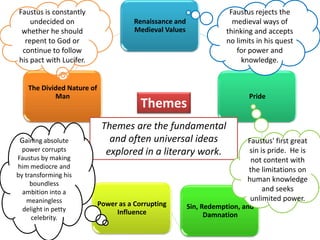Report
Share

Recommended
Recommended
More Related Content
What's hot
What's hot (20)
Metaphysical poetry and donne as metaphysical poet

Metaphysical poetry and donne as metaphysical poet
Victorian Poet: Alfred Tennyson and Robert Browning

Victorian Poet: Alfred Tennyson and Robert Browning
Macflecknoe or a satyr upon the trew blue-protestant poet

Macflecknoe or a satyr upon the trew blue-protestant poet
Viewers also liked
Viewers also liked (12)
She stoops to conquer as an anti sentimental comedy

She stoops to conquer as an anti sentimental comedy
English Literature - Elizabethan playwrights slide show

English Literature - Elizabethan playwrights slide show
Christopher Marlowe's Contribution to English Drama

Christopher Marlowe's Contribution to English Drama
Similar to Dr. Faustus themes and symbols
Similar to Dr. Faustus themes and symbols (12)
Dr. Faustus themes and symbols
- 1. Renaissance and Medieval Values Pride Sin, Redemption, and Damnation Power as a Corrupting Influence The Divided Nature of Man Themes Themes are the fundamental and often universal ideas explored in a literary work. Faustus rejects the medieval ways of thinking and accepts no limits in his quest for power and knowledge. Faustus' first great sin is pride. He is not content with the limitations on human knowledge and seeks unlimited power. Faustus is constantly undecided on whether he should repent to God or continue to follow his pact with Lucifer. Gaining absolute power corrupts Faustus by making him mediocre and by transforming his boundless ambition into a meaningless delight in petty celebrity.
- 2. Sin • Christianity defines as acts contrary to the will of God. • In making a pact with Lucifer, Faustus commits what is in a sense the ultimate sin: not only does he disobey God, but he consciously and even eagerly renounces obedience to him, choosing instead to swear allegiance to the devil. Damnation • Countless moments in which Faustus considers doing just that, urged on by the good angel on his shoulder or by the old man in scene 12—both of whom can be seen either as emissaries of God, personifications of Faustus’s conscience, or both. • Each time, Faustus decides to remain loyal to hell rather than seek heaven. In the Christian framework, this turning away from God condemns him to spend an eternity in hell. Redemption • In the final scene, he cries out to Christ to redeem him. But it is too late for him to repent. In creating this moment in which Faustus is still alive but incapable of being redeemed, Marlowe steps outside the Christian worldview in order to maximize the dramatic power of the final scene. Having inhabited a Christian world for the entire play, Faustus spends his final moments in a slightly different universe, where redemption is no longer possible and where certain sins cannot be forgiven.
- 3. Symbols Symbols are objects, characters, figures, or colours used to represent abstract ideas or concepts. Blood Faustus’s Rejection of the Ancient Authorities The Good Angel and the Evil Angel When Faustus signs away his soul, he signs in blood, symbolizing the permanent and supernatural nature of this pact. This rejection symbolizes Faustus’s break with the medieval world, which prized authority above all else, in favour of a more modern spirit of free inquiry Good angel urging him to repent and serve God, the evil angel urging him to follow his lust for power and serve Lucifer. The two symbolize his divided will, part of which wants to do good and part of which is sunk in sin.
